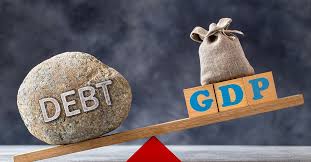Nigeria’s public debt is fast approaching a record-breaking N200 trillion, sparking widespread concern across the private sector and among economic experts who fear the country may be hurtling toward a deeper fiscal crisis.
As of the first quarter of 2025, the Debt Management Office (DMO) placed the public debt at N149.4 trillion.
However, with the National Assembly recently approving new borrowing requests—including a $21.5 billion foreign loan and a $347 million domestic credit facility—analysts say the debt could balloon well past N200 trillion by the end of the year.
What has amplified the crisis, observers say, is the sharp depreciation of the Naira, which has inflated the local currency value of Nigeria’s external borrowings.
Under President Bola Tinubu, the annualised growth of public debt is nearing 100%, nearly tripling the rate under former President Muhammadu Buhari, whose administration was itself heavily criticised for excessive borrowing.
“We are borrowing more but investing less in areas that truly grow the economy,” said Dr. Femi Egbesola, President of the Association of Small Business Owners of Nigeria (ASBON).
“Small businesses are already bearing the brunt through over-taxation, policy instability, and shrinking government support.”
While Tinubu’s foreign loans in dollar terms average $1.7 billion annually, the naira-denominated value now averages N25.5 trillion per annum due to currency volatility.
Under Buhari, foreign debt averaged $4.15 billion annually but only N2.2 trillion in local currency, revealing just how steep the devaluation has become.
Domestic borrowing has also surged. The Tinubu administration is now borrowing domestically at a rate that has grown over 100% in two years, compared to Buhari’s 24% over eight years.
ASBON’s Egbesola warned that the debt surge is crowding out productive sectors and discouraging investment.
“Debt servicing now consumes more than capital projects. This stifles innovation, hinders credit access, and increases the risk of economic stagnation,” he said.
He called for fiscal discipline, better tax efficiency, and revenue diversification, stressing that only productive borrowing tied to measurable ROI can ensure long-term sustainability.
The Lagos Chamber of Commerce and Industry (LCCI) also expressed alarm over the rising debt and urged the Federal Government to prioritise non-oil revenue sources.
“Much of the increase in debt stock is due to Naira devaluation, not necessarily fresh inflows. But it means our repayment cost has gone up astronomically,” said Gabriel Idahosa, LCCI President.
He noted that instruments such as bonds, treasury bills, sukuk, and green bonds are pushing up interest rates and squeezing out credit to the private sector.
Similarly, Olatunde Amolegbe, former President of the Chartered Institute of Stockbrokers, emphasised the importance of Nigeria’s repayment capacity and urged caution in the application of borrowed funds.
“Borrowing isn’t bad in itself, but without proper utilisation, we’re only mortgaging the future,” he said.
According to Tunde Abidoye of FBNQuest Merchant Bank, Nigeria’s debt-to-GDP ratio has already climbed from 40% to 52% and could hit 64% by the end of 2025 if the current trend continues.
“The DMO needs to publish a new Fiscal Strategy Paper to reflect the new realities. Otherwise, we risk running into a wall of unsustainable debt,” Abidoye warned.
Economist Clifford Egbomeade said while parts of the borrowing plan, such as settling pension liabilities, could stimulate domestic consumption, the long-term benefits hinge on transparency and efficient implementation.
“Targeting key sectors like agriculture and infrastructure could create jobs and boost productivity. But without reforms to curb waste and corruption, we risk sinking deeper into the debt trap,” he said
Do you want to share a story with us? Do you want to advertise with us? Do you need publicity for a product, service, or event? Contact us on WhatsApp +2348183319097 Email: platformtimes@gmail.com
We are committed to impactful investigative journalism for human interest and social justice. Your donation will help us tell more stories. Kindly donate any amount HERE




